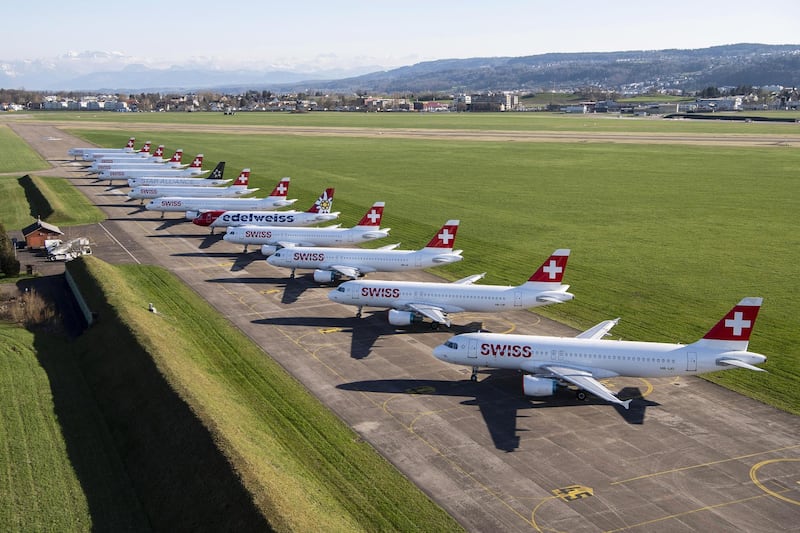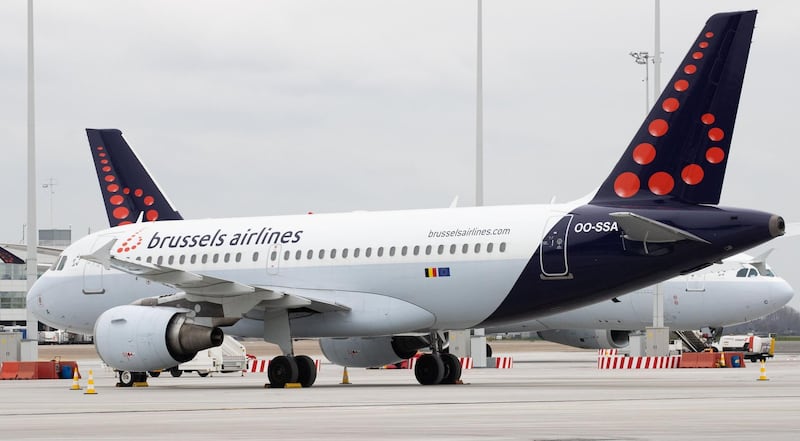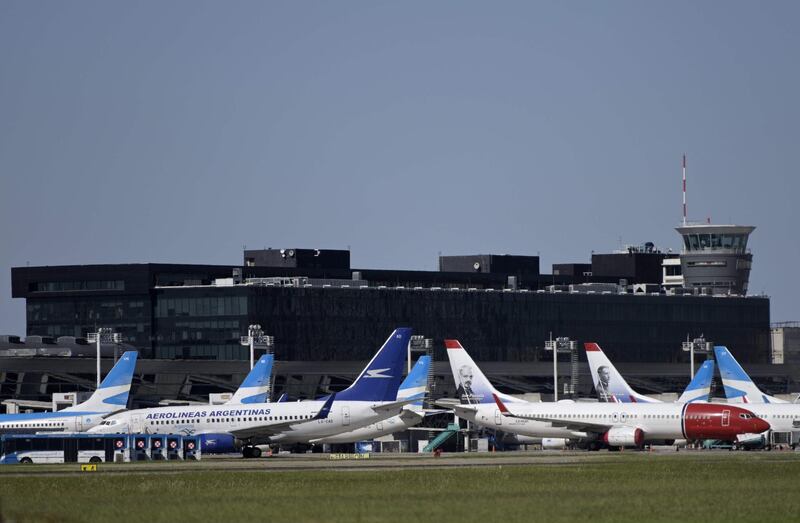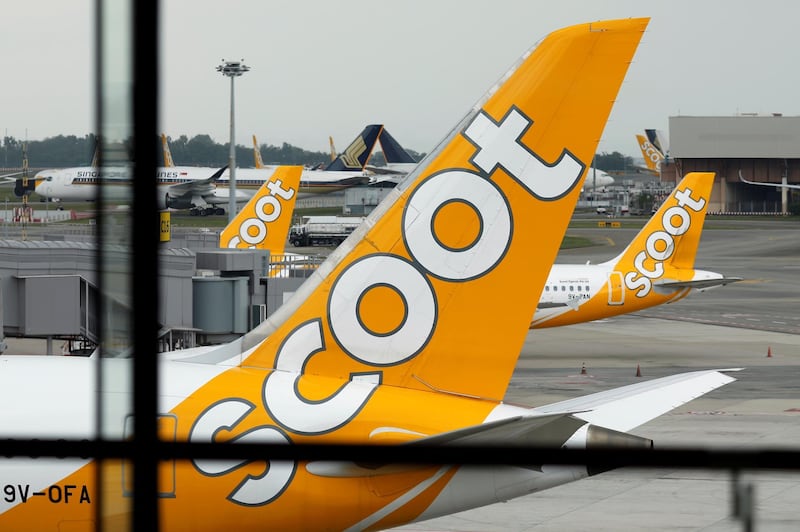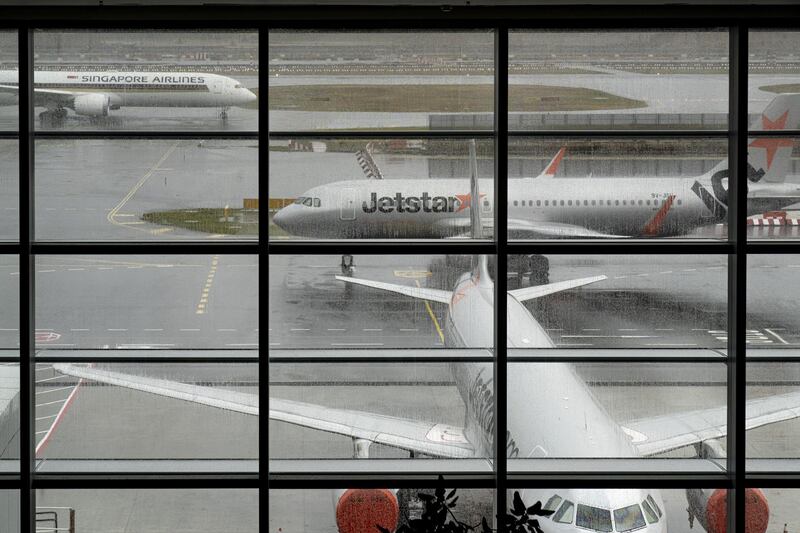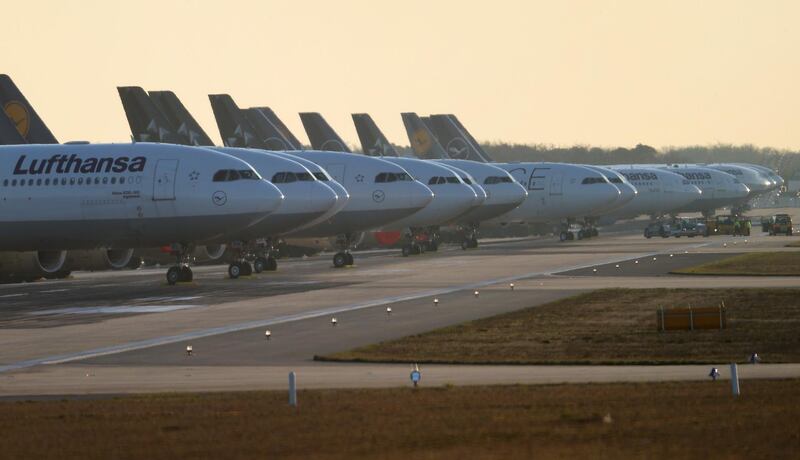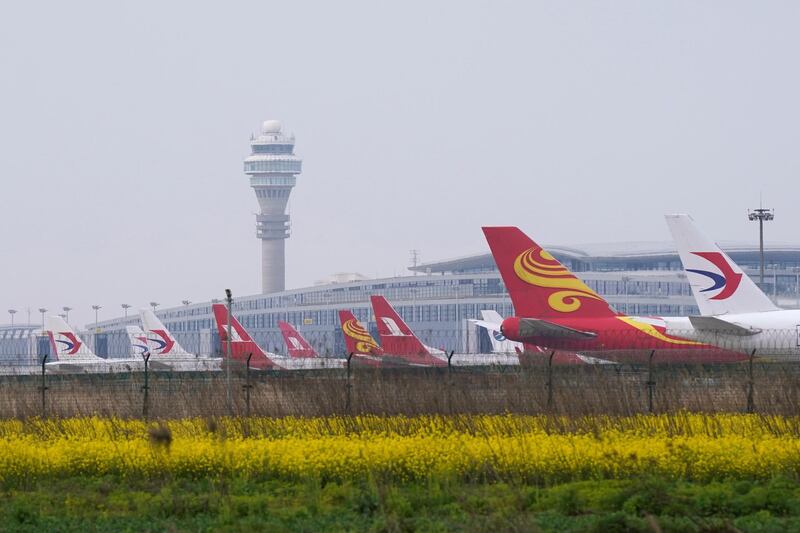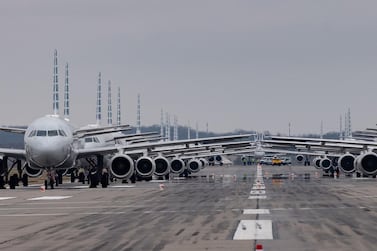The Covid-19 pandemic has emptied the skies of busy traffic, posing an additional challenge to cash-strapped airlines to find enough tarmac space and maintain grounded jets in top shape for an eventual return to service.
About 64 per cent of the world's 26,000 passenger planes are currently grounded, according to data provider Cirium, as the coronavirus devastates air travel demand and unleashes the worst peacetime crisis in the aviation industry's history.
Parking and storing aircraft is an expensive and complex process but with 16,640 idle planes globally this is unfolding at an unprecedented scale for a prolonged period as the deadly virus spreads.
"The business case for storing versus parking planes is a key one that every airline is going through now," Robbie Bourke, vice president of engineering and maintenance at Oliver Wyman, said. "The unknown variable is how long will this go on for."
The number of aircraft currently in service is at the lowest level since March 1994, according to Cirium, with the problem of orchestrating a large-scale grounding adding to the woes of operators. Global airlines are facing a liquidity crisis, risk of bankruptcy and estimated passenger revenue losses of $314 billion (Dh1.1 trillion) in 2020, as they slash capacity or completely suspend passenger flights.
With nearly two-thirds of the world's jets grounded, the question is where to put them. Airlines are scrambling to find space at the runways or gates of airports, military facilities, and even aircraft "boneyards"-- a storage area for planes retired from service such as in the Mojave desert in California. Selecting an airport depends on factors such as the weight restrictions of their runways and the actual space available as demand rises.
Keeping an airplane's airworthiness during the grounding requires a lot of work, maintenance checks and engineering approvals--depending on how long the aircraft will be grounded, Mr Bourke said.
This entails cleaning cabins before sealing them for security, draining fuel tanks and oil lines and protecting exposed chrome surfaces from corrosion, according to the International Air Transport Association (Iata). Protection is necessary against harsh weather conditions such as humidity and dust that can corrode plane parts. Unwelcome guests such as birds, insects or rodents that can damage interiors or wiring.
Longer periods of grounding require weekly maintenance, including checking operating systems such as avionics and hydraulics and keeping the cabin sanitized and dry, Iata said.
The exact procedure depends on whether an airline will park or store its planes. Parking means the aircraft is taken out of service for up to six months and given regular light maintenance to preserve a ‘ready to go’ state, allowing a rapid return to service, Airbus said on its website.
On the other hand, planes are stored when the planned period out of service is up to two years. In this case, "airworthiness can be maintained but more preferable is a reduced maintenance schedule combined with preservation activities, such as sealing and greasing," Airbus said.
Airlines must also consider parking costs.
"Aircraft parking charges account for less than 2 per cent of airport revenues in a normal year, but it could be the make-or-break for some airlines under the current circumstances," Iata said in its online magazine.
Charges vary by airport location and aircraft type. For example in India, parking a widebody jet can cost $1,000 per day, according to Mark Martin, head of Martin Consulting.
Etihad Airways, which parked 80 per cent of its passenger planes at Abu Dhabi International Airport’s Southside Terminal, said it is using the downtime to accelerate maintenance activities on its jets.
"I've never seen anything like this before in my aviation career," Gary Byrne, Etihad's head of technical operations said in a video released by the airline.
Work includes covering the engines and Auxilliary Power Units (APUs) to protect against environmental factors, blocking sensors, and disconnecting batteries to preserve the aircraft.
"We have engineers working around the clock maintaining the aircraft, they're very intricate complex piece of machinery," Mr Byrne said. "It's not like parking a car, we have to keep them maintained."
A staff of 200 workers per shift clean the aircraft cabin, ranging from replacing seat covers to shampooing the carpets.
Extensive and varied engineering activities are required by both Airbus and Boeing when aircraft are parked for extended periods to protect planes and their systems, Etihad said.
Static port and pitot probes and other inlets are covered to protect from airborne debris or wind, windows and flight decks are covered, wheels and brakes are covered and the wheels are rotated at regular intervals. Items such as batteries are removed and checked regularly. Power is connected at regular intervals to test aircraft systems. Exteriors are checked regularly.
Meanwhile, Flydubai's Boeing 737 has been undergoing a scheduled maintenance programme since the UAE announced the temporary suspension of passenger flights starting March 25.
The carrier's Boeing 737-800 aircraft are kept in Operational Ready status, in which the aircraft will be flown at least once either for repatriation flights, cargo flights or maintenance flights, it said in a statement. Maintenance flights will operate between Dubai International (DXB) and Al Maktoum International (DWC).
"Our team of highly qualified and experienced engineers are working around the clock to perform the scheduled aircraft maintenance tasks to ensure all our aircraft are maintained to the highest levels of airworthiness in preparation for return to service (RTS)," Mick Hills, Senior Vice President of Engineering and Maintenance at flydubai, said. "We follow closely the guidance issued by the manufacturer and the authorities to look after our fleet whether in Active Storage as for the MAX aircraft or in Operationally Ready status as for the temporarily grounded Next-Generation Boeing 737-800 aircraft.”
Plane manufacturers provide maintenance manuals to their airline customers on exactly what needs to be done and when.
Boeing said it worked closely with operators to discuss the options for parking and storing their airplanes.
"In our meetings, we discussed Boeing’s recommendations depending on how long the airline plans to park/store the airplanes and what resources they have to maintain them," Omar Arekat, Boeing vice president of commercial sales and marketing in the Middle East, Turkey and Africa, said.
"We have also convened calls with airlines to discuss the regulations around using passenger airplanes to fly cargo," Mr Arekat said. "We have provided Boeing’s recommendations for utilizing commercial airplanes in this manner in lieu of flying passengers due to reduced demand.”
Airbus said the current situation calls for "exceptional measures" and reaction to provide support to operations during this difficult time while maintaining top safety levels.
"Never in the history of aviation have airlines had to ground so many aircraft, so quickly," said Gilles de Cevins, Airbus' head of maintenance programmes and services, said. "They need help to reduce the huge and sudden maintenance workload, and to ensure a quick return to service when required".
